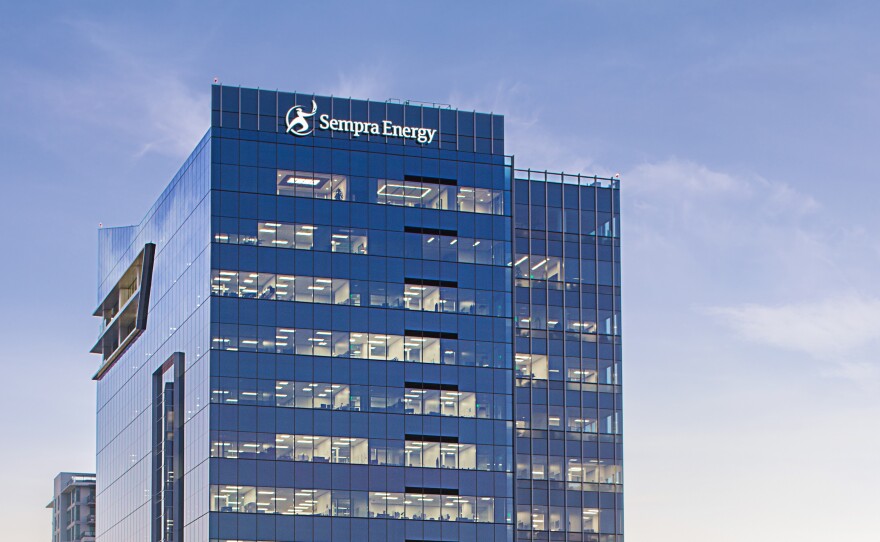State officials say lobbyists for Sempra Energy's new marketing division, Sempra Services, may have violated state law by meeting with some San Diego elected officials.
That's because Sempra Services has not received full approval from the state agency that oversees utilities, the California Public Utilities Commission.
The California Public Utilities Commission has confirmed it is investigating Sempra and its utility, San Diego Gas & Electric, for beginning to lobby before receiving full approval.
But the utility argues it is doing no such thing.
RELATED: State Commission Investigating SDG&E For Lobbying Against Community Energy Program
The dispute centers around an alternative energy program called community choice, which would allow cities and counties to bypass SDG&E and decide on their own where to buy energy, which could allow them to choose more renewable energy sources.
What is community choice aggregation?
Right now, San Diego Gas & Electric provides power through its system of lines and wires to every city in San Diego County and southern Orange County. SDG&E buys the electricity from a variety of sources, including natural gas plants, hydroelectric dams and wind turbine farms.
If a city goes with community choice aggregation, power would still go through SDG&E’s grid, but the city would buy the energy, not the utility. That allows cities to have more control over how much of their energy comes from renewable sources and the cost for that electricity.
State law prevents utilities from marketing or lobbying on community choice aggregation unless they set up an independent organization that is not funded by ratepayers.
That's what Sempra Energy did by establishing Sempra Services, but that organization has not been completely approved by the state.
However, people working for Sempra Services have been meeting with San Diego elected officials anyway. They also spoke about community choice at a recent San Diego County Board of Supervisors meeting.
RELATED: Sempra May Have Broken State Rules By Lobbying On Energy Program
The city of San Diego's records show a lobbying firm called Responsible Solutions headed by Lani Lutar met with the following elected officials and their staff:
—Mayor Kevin Faulconer.
—Stephen Puetz, the chief of staff for Mayor Kevin Faulconer.
—Mike Hansen, the deputy chief of staff and chief of policy for Mayor Kevin Faulconer.
—City Councilman Chris Cate.
—Ian Clampett, the deputy chief of staff and chief of policy for City Councilman Chris Cate.
—Jack Straw, the director of land use and environmental policy for Mayor Kevin Faulconer (the form lists Straw as a staffer for Councilman Scott Sherman, but Sherman's spokesman said he was no longer working in that office at the time of the meeting).
The records say the meetings were about implementation of the city's climate action plan, which includes the consideration of community choice.
City council members' calendars from 2016 and the first two months of 2017 also show Lutar met once with Councilman David Alvarez and twice with Councilman Mark Kersey. A spokeswoman for Alvarez said the meeting was about "the Otay Valley Regional Park Concept Plan Update and a related matter of the Skydive San Diego lease."
Kersey's chief of staff said the two Lutar meetings "didn’t have to do with Sempra or SDG&E, they had to do with our infrastructure committee priorities for the year."
Kersey's calendar also shows he met with Frank Urtasun, who told KPBS he works for Sempra Services. However, on city forms Urtasun is most recently registered as a lobbyist for Sempra Energy.
Kersey's chief of staff said the meeting "had to do with climate action plan implementation."
City forms show Urtasun also met with Faulconer's staff about implementation of the climate action plan.
Meetings like those and public comments at the county meeting are the reason SDG&E is being investigated by the California Public Utilities Commission.
A spokeswoman for the commission said by email earlier this month that "SDG&E is not in compliance with the California Public Utilities Commission Resolution allowing them to form an Independent Marketing Division with conditions and consequently may not be participating in lobbying activities that could only be performed by the marketing division."
"SDG&E attorneys have argued that under their particular reading of the Resolution they are allowed to lobby," she said. "The California Public Utilities Commission is investigating the facts surrounding their community choice-related communications."
Amber Albrecht, a spokeswoman for SDG&E, said by email that the utility "is not lobbying" on community choice. Instead, she said, their understanding is that the California Public Utilities Commission has approved their independent organization to lobby on community choice.
In August, the California Public Utilities Commission gave initial approval to the organization but said it still needed more information from SDG&E.
Then in December, the commission said marketing and lobbying on community choice was suspended because SDG&E had not given enough information to show the organization is independent enough from the utility.
Albrecht said that proposed changes to SDG&E's independent organization are being reviewed by California Public Utilities Commission staff, but that doesn't block the organization from operating.
"Staff has no authority to override the California Public Utilities Commission’s resolution," she said. She added that the commission "has no authority" to stop the independent organization "from exercising its First Amendment right to speak, particularly here where the ban would be applied to control the content of Sempra Services’ speech."
California Public Utilities Commission staff still have not said how long the investigation could last, or what the consequences of it could be.







